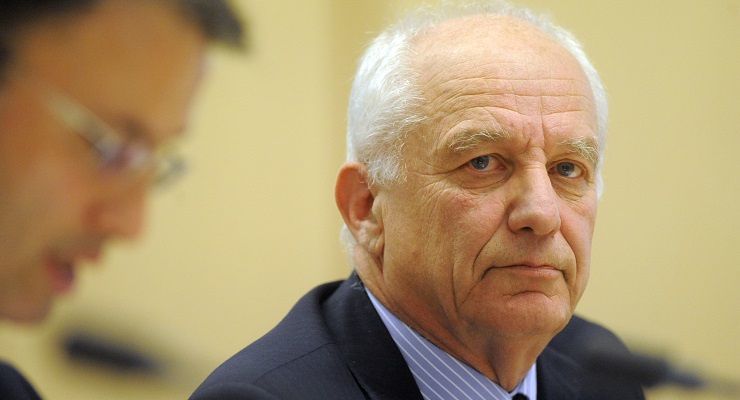
During the great naval Battle of Copenhagen in 1801, the cautious British fleet commander Admiral Sir Hyde Parker used signal flags to order Vice Admiral Horatio Nelson to discontinue the action.
Nelson reportedly put his telescope to his blind eye and said “I see no signal”, then pressed home the attack for a devastating victory.
When it comes to the Victorian government and Crown Casino, it seems warning flags were ignored and the result was not devastating victory but a disastrous commercial and reputational crisis.
To misquote Jane Austen — writing at about the same time as Nelson’s famous defiance — it is a truth universally acknowledged that just about every crisis is preceded by red flags or warning signs.
This week’s shocking report by royal commissioner Ray Finkelstein into corporate misbehaviour at Crown chronicles in excruciating detail “illegal, dishonest, unethical and exploitative” conduct.
He concluded: “Within a very short time, the commission discovered that for many years Crown Melbourne had engaged in conduct that is, in a word, disgraceful.”
Others will spend months poring over the 652-page report and its abysmal tale of money laundering, tax evasion and criminal behaviour. But for crisis managers the key question is how the company, the Victorian government and its watchdog regulator failed to see — or ignored — red flags the size of Tasmania.
While Crown has very generously been given two years to “clean up its act”, where is the accountability? Crown Group chair Helen Coonan and Crown Melbourne chief Xavier Walsh resigned — presumably with a comfortable payment. Yet what about the politicians, regulators and Crown executives who did a Lord Nelson and turned a blind eye to disgraceful behaviour?
It’s generally accepted that the Andrews government resisted calls for an inquiry into Crown for years until its hand was forced by the New South Wales Bergin inquiry, which found the group unfit to hold a casino licence in that state.
How do crisis warning signals get ignored?
Finkelstein found the board was either not told what was going on, or “fell asleep at the wheel”. He also found that many senior executives were “indifferent to their ethical, moral and sometimes legal obligations”.
Yet none of his 33 recommendations suggests or implies any action against individuals. Instead, he recommended broadening and extending the functions of inspectors to ensure there is appropriate supervision of conduct on the casino floor and to help detect criminal activity.
He also recommended the Casino Control Act be amended to oblige the casino operator to notify the regulator of a material breach, or a likely material breach, of relevant laws, and to prohibit them from making false or misleading statements or providing false or misleading material to the regulator on pain of a significant penalty.
Really? It requires a law to get Crown to report any breaches, and not to lie to government officials? Little wonder there seems to be no real accountability for years of misbehaviour.
And that is partly why red flags get ignored.
As Finkelstein dishearteningly commented on the senior executives who were involved in the misconduct: “Some were motivated by a drive for profit. Some simply did what they did because they could.”
Ignoring red flags is not new. As I wrote recently in Crikey, when the giant French Société Générale lost about $7 billion through unauthorised transactions by a single rogue trader, an independent inquiry found the bank had failed to act on 75 red flags over 18 months.
And after the collapse of the $65 billion Bernie Madoff investment fraud, the US Securities and Exchange Commission inspector-general David Kotz admitted his agency missed “numerous red flags” from 1992 until the fraudster was arrested in December 2008, and he conceded five investigations into Madoff’s operation had been bungled.
Or consider the AirAsia Airbus which crashed into the sea off Indonesia in 2014. The cause was human error triggered by a maintenance fault which had occurred 23 times in the previous 12 months. The BBC called the official report the “anatomy of an avoidable crash”.
Or the disastrous Deepwater Horizon oil rig fire in the Gulf of Mexico in 2010 where evidence was given that vital warning systems had been disabled to spare workers being woken by false alarms.
If anything is to be learnt from the case of Crown, we need to go beyond the royal commission. Finkelstein did a great job detailing what happened and recommending steps to prevent it reoccurring. But for other companies trying to take lessons from this fiasco, the issue remains exactly how such bad behaviour was allowed to happen in the first place.








“He also recommended the Casino Control Act be amended […] to prohibit them from making false or misleading statements or providing false or misleading material to the regulator on pain of a significant penalty.
Really? It requires a law to get Crown to report any breaches, and not to lie to government officials? Little wonder there seems to be no real accountability for years of misbehaviour.”
The Commonwealth Criminal Code, Division 137 ‘False or misleading information or documents’ makes it illegal to give information to a Commonwealth entity in compliance, or purported compliance, with a law of the Commonwealth that is false or misleading by its content or omissions. There is absolute liability and the penalty is up to 12 months prison. To make sure a breach can be prosecuted it is good practice to get the person giving the information to sign a declaration at the end of their document acknowledging Division 137 applies. Apparently Victoria has no equivalent to this in its state Criminal Code. Weird. But I would not say the Commonwealth shows any great enthusiasm for enforcing its own law either as far as it applies to big business.
The problem is non enforcement, not a shortage of appropriate legislation – the new swear word for Barnyard.
Perhaps someone could tell him that Parliament is a legislative body or it is nothing.
At present it is the latter.
How did the commonwealth government miss the red flag Interpol had on the main domino and then grant him citizenship? When will the proceeds of crime be stripped from the major players? Crown corrupted both sides of state and federal political parties but not a mention of a politician in the inquiry. Andrew Wilkie asked for an inquiry into Crown some time back both major parties ignored him The result of the inquiry as the share value shows was a win for Crown and all who served.
If we must have casinos because state governments rely on their revenue and the employment they provide, they should be owned by the public and run by the government. Now that Crown has lost its license, the casino should pass into the hands of the state.
The same should happen with the Big Buttplug in Barangaroo.
Corporate crime, alive and well remunerated in Australia !
As with the b/s banking royal commission , no ones accountable, no executive going to goal, everyone’s looked after, except of course the poor mugs who are the taxpayers, the victims of corporate crime and families of problem gamblers
I thought ignorance was not an excuse for directors faced with this sort of liability – although there have been other notable exceptions usually for those who can afford extended legal proceedings.
On the contrary, ignorance is generally accepted as a complete defence so far as any criminal liability of directors is concerned.
The courts typically require the prosecution to show any accused director or senior manager acted as a ‘controlling mind’ to direct the criminal behaviour. This is usually enough to prevent a conviction, even if a case makes it as far as a court. Of course it always works when there’s no proof the director knew about the alleged criminality.
The director’s ignorance might then be used to show the director was not doing his/her job, but that’s relatively trivial, a slap on the wrist and a little embarrassment at most.